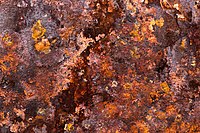
Photo from wikipedia
Abstract Although the oxidation processes mediated by persulfate (PS) and peroxymonosulfate (PMS) attract more attention in the degradation of various recalcitrant contaminants, the high concentrations of oxidants required for the… Click to show full abstract
Abstract Although the oxidation processes mediated by persulfate (PS) and peroxymonosulfate (PMS) attract more attention in the degradation of various recalcitrant contaminants, the high concentrations of oxidants required for the low concentrations of contaminants always limit their large-scale applications. In this work, aniline can be effectively oxidized by CuO and PS under pH-neutral and alkaline conditions. The increased observed rate constant (kobs) values with increasing pHs indicate that the oxidation of aniline is facilitated by solution OH−. Meanwhile, the low ratios between the removed PS and aniline (1.19 at pH 7.0 and 1.68 at pH 12.0) indicate the high catalytic oxidation efficacy of the CuO-PS system. The insignificant contributions of SO4 −, OH, 1O2 and O2 − to aniline oxidation in quenching experiments and EPR analysis suggest that PS is likely activated on the surface of CuO via the non-radical pathway. The presence of carbon-centered radicals (CCRs), as well as UV and GC MS analysis, indicates the important intermediates of PhNH2 + and PhNH radicals during the oxidation process, revealing that separate transfer of an electron from aniline to the activated PS, followed by subsequent abstraction of a H+ by OH− to form PhNH are two important steps in the oxidation process. Further coupling of PhNH radicals results in the formation of insoluble polyaniline polymers at pHs 7.0 and 12.0. The high thermal stability and ideal pseudo-capacitive properties of the insoluble products indicate that the polyaniline produced from aniline wastewater can be used for high-temperature-resistant materials or capacitors. This study provides an efficient alternative to turn aniline waste to polyaniline polymers.
Journal Title: Molecular Catalysis
Year Published: 2021
Link to full text (if available)
Share on Social Media: Sign Up to like & get
recommendations!